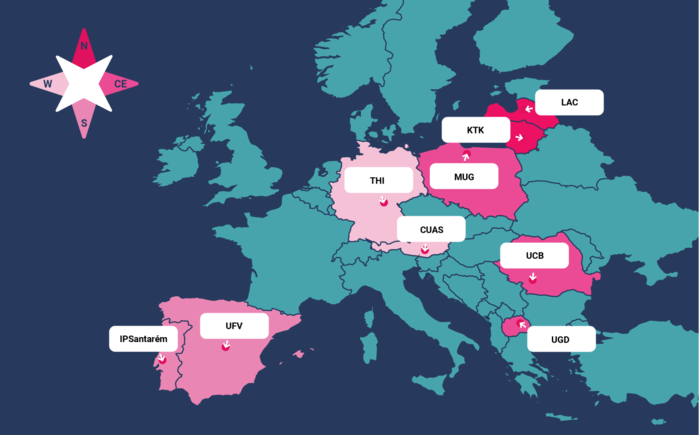The MUG European University in the ACE2-EU consortium
1.07.2024
The Medical University of Gdańsk has received a positive decision from the European Commission to qualify the new Applied, Connected, Entrepreneurial, and Engaged European University (ACE2-EU) alliance project for funding. The consortium, which the MUG has joined, is one of the best evaluated in a group of 56 funding applications from across Europe.
ACE2-EU aims to equip students, staff, researchers, and external stakeholders with the knowledge, skills, and competencies needed to address future societal challenges in Europe collectively. Meeting these challenges, including digital and environmental transformation and socio-economic issues, will ensure a sustainable social transformation. To fulfill this mission, the Medical University of Gdansk, together with a group of 8 universities, will receive funding of €14.3 million from the European Commission to create a new alliance of European Universities.
By the decision of the Rector, Prof. Marcin Gruchała, an interdisciplinary team for the preparation of the application to the EC on the part of the University was responsible for the preparation of the application for the European Universities Alliance initiative, under the leadership of the Rector-elect, Prof. Michał Markuszewski, Vice-Rector for Science.

The leader of ACE2-EU is the Polytechnic University of Santarém from Portugal. The consortium includes:
- University of Applied Sciences Carinthia – Austria
- Constantin Brâncusi Târgu University – Romania
- Goce Delcev University – North Macedonia
- Kauno Technikos Kolegija – Lithuania
- University Francisco de Vitoria UFV – Spain
- Latvian Academy of Culture – Latvia
- Technische Hochschule Ingolstadt – Germany.

members of the ACE2-EU consortium
The alliance has attracted 56 institutional partners from across Europe, i.e. businesses, regions, large industrial corporations, and government authorities, who will support the ACE2-EU idea.
Later this year, the European Commission will announce a list of 10 new alliances with funding sought by 50 consortia. So far, the University of Gdańsk (SEA-EU alliance) and Gdańsk University of Technology (ENHANCE alliance) have joined similar initiatives in the Tri-city.
Participation in an alliance officially supported by the European Commission as part of the Erasmus+ programme offers great opportunities for closer cooperation and the implementation of joint studies, academic exchanges, the creation of incubators, and new international forms of student education. The ACE2-EU project plans to intensify academic exchanges, fund international cutting-edge teaching projects, increase student involvement in the creation of teaching forms, and support the preparation of graduates to best meet the needs of today’s labour market.
The official results of the call for new alliances are available at the website.
Detailed information about the activities of ACE2-EU and its members is available at https://ace-eu.ipsantarem.pt. More information about European Universities can be found on the website.
ACE2-EU graphics
Archives
- Academic Year 2024/2025
- Academic Year 2023/2024
- Academic Year 2022/2023
- Academic Year 2021/2022
- Academic Year 2020/2021
- Academic Year 2019/2020
- Academic Year 2018/2019
- Academic Year 2017/2018
- Academic Year 2016/2017
- Academic Year 2015/2016
- Academic Year 2014/2015
- Academic Year 2013/2014
- Academic Year 2012/2013